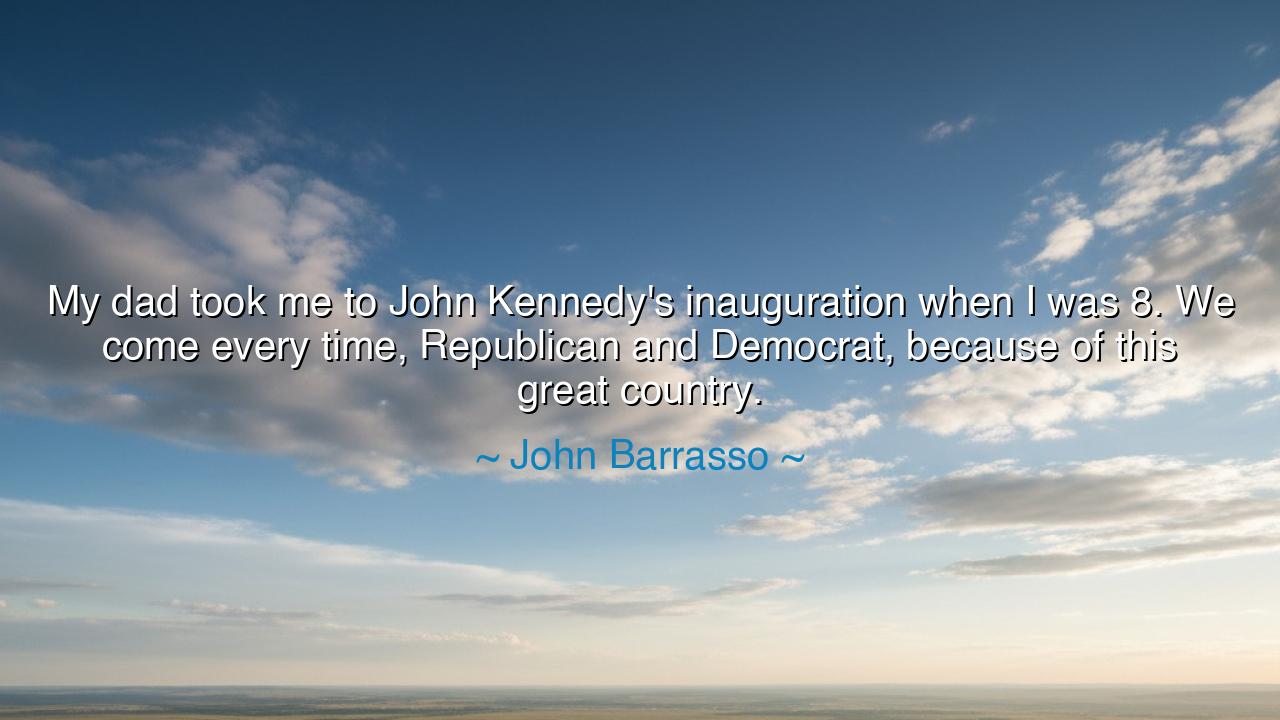
My dad took me to John Kennedy's inauguration when I was 8. We
My dad took me to John Kennedy's inauguration when I was 8. We come every time, Republican and Democrat, because of this great country.






When John Barrasso said, “My dad took me to John Kennedy’s inauguration when I was 8. We come every time, Republican and Democrat, because of this great country,” he was not simply recalling a childhood memory — he was bearing witness to the enduring spirit of democracy. His words are a quiet hymn to the idea that beyond party or policy, there is something sacred that binds the people of a nation together: love of country. This quote speaks of continuity, reverence, and faith — faith not in perfection, but in the shared belief that the democratic process, with all its noise and rivalry, is worth celebrating.
The origin of this quote lies in Barrasso’s own life, shaped by family, tradition, and civic duty. As a young boy of eight, he stood with his father in the cold January air of 1961, watching John F. Kennedy take the oath of office — an inauguration remembered for its words of hope and call to service: “Ask not what your country can do for you — ask what you can do for your country.” For Barrasso’s father to bring him there was an act of devotion — not to a man or a party, but to a principle: that the peaceful transfer of power, the gathering of the people in unity and expectation, is itself the beating heart of American freedom. That moment left its mark on the boy, who would grow into a man of public service, returning to each inauguration as a renewal of that same civic faith.
In this, Barrasso’s statement reflects a truth the ancients understood well: that rituals preserve the soul of a people. Just as the Greeks gathered in the Agora to witness the choosing of their leaders, or the Romans stood in the Forum to mark the rise of a new consul, modern citizens gather not only to celebrate victory but to affirm the endurance of the republic. To attend both Republican and Democrat inaugurations, as Barrasso and his family do, is to recognize that nations are built not by unanimity, but by the shared acceptance of legitimate change. It is the acknowledgment that in a free land, the ceremony belongs to all, not to the victorious alone.
There is deep wisdom in this — for history is filled with empires and kingdoms that fell because they could not endure disagreement. When succession led to strife, when pride eclipsed unity, their greatness faded into dust. Yet, in the American story, and in every nation that honors the rule of law, there remains this quiet miracle: that even when the hearts of citizens are divided, the people still gather beneath the same sky to say, “We will continue together.” Barrasso’s memory, then, is not nostalgia — it is a testament to endurance. It tells us that the strength of a country is measured not by its ease, but by its ability to stand firm through difference.
Consider, too, the symbolism of the father and child in Barrasso’s words. The father, a man of one generation, brings the son — the next — to witness history unfold. This act mirrors the eternal duty of parents and elders: to pass on not only knowledge, but reverence; not only stories, but the sense of belonging to something greater than oneself. In that small, simple gesture — a father taking his son to an inauguration — lies the foundation of patriotism that is born not from slogans or anger, but from presence, from witness, from understanding that freedom must be renewed in every heart.
And so, the quote becomes not merely a recollection, but a lesson for all generations. It reminds us that citizenship is not passive — it is a living act, one that requires participation, humility, and respect. To attend an inauguration of any leader, regardless of party, is to affirm faith in the continuity of governance, in the system that protects liberty even when opinion divides. It is to say, “This is my country still. Its triumphs and trials are mine alike.”
Therefore, my child, let these words guide you: love your country more than your faction. Be loyal not to victory, but to the process by which the people speak. Honor the moments that unite, even when you disagree with those who lead. Attend the ceremonies of democracy, if not in person, then in spirit — for they are the sacred rhythm of the free. As John Barrasso’s father taught him, and as he now teaches others, it is not one party, nor one era, that defines the greatness of a nation — but the enduring will of its people to gather, to hope, and to believe still in the great country that is their common home.






AAdministratorAdministrator
Welcome, honored guests. Please leave a comment, we will respond soon